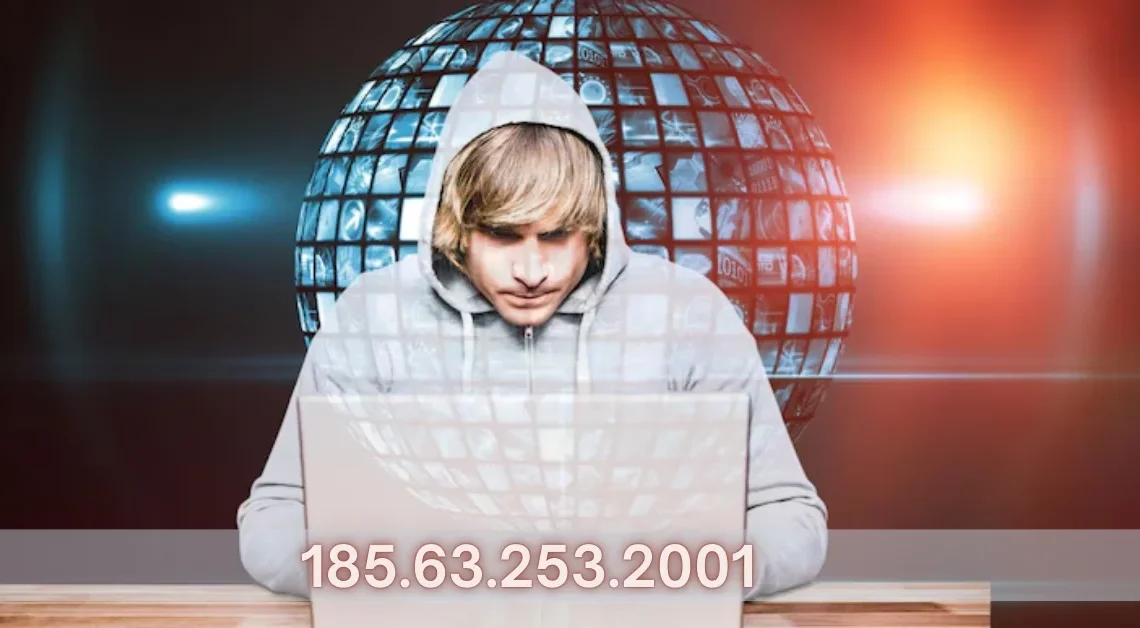Table of Contents
Have you ever encountered the IP address 185.63.253.2001 and thought to yourself, This looks like an IPv4 address, but why does it look like it’s not working, and why isn’t the system recognizing it? In spite of its looks, it has some boundaries to work under; an IPv4 address can be described as a form of A.B.C.D. When placed in any IP formatted structure, there is a format that A, B, C, and D must follow. D cannot exceed 256; arraying them may make sense, then yes, it would work as an IPv4, but it makes no sense logically or syntactically, thus this case is non-functional.
This issue sits with the question of what actually makes it syntactically incorrect, where I’ll be addressing accurate IPs and reliable connections. Allow me to teach you the basics of an IP address, highlighting various concerns such as judgment of validation and precision, prioritizing overlaps of factors while allowing complete effect, and providing actionable guidance to resolve mistakes.
Understanding IP Addresses: The Basics

- To recognize the reasons why 185.63.253.2001 is invalid, some points explain the importance of an IP address. An Internet Protocol (IP) address acts as a unique identifier tagged to every device that is connected to a network for allowing communication and the exchange of data.
- IPv4 vs. IPv6
- The majority of IP addresses are categorized into one of two types:
- IPv4 (Internet Protocol version 4): The older and presently more widespread system. An IPv4 address is made up of four octets -numerical parts- ranging from 0 to 255, separated by periods. For example, 185.63.253.200.
- IPv6 (Internet Protocol version 6): A newer format designed to combat address exhaustion. An IPv6 address augments the limit of addresses since they’re longer, using hexadecimal numbers instead, which are separated by colons and periods (e.g, 2001:0db8:85a3::370:7334).
- Essential advantages of having an IP address
- IP addresses are employed to:
- Control the effective routing of data packets in the network.
- Make certain a device is identifiable as well as communicable with other devices.
- Enable and control security functions of a network, such as firewalls and authentication measures.
Why Is 185.63.253.2001 Invalid?
Although 185.63.253.2001 appears to be a feasible IPv4 address, it fails to comply with one critical aspect of the format. The range of each segment in an IPv4 address, referred to as an octet, should not exceed 255, and “2001” breaches this limitation.
Why 185.63.253.2001 may contain invalid IPs.
IP address errors caused by typing
An IP address can be rendered useless simply by a typo, such as incorrectly typing a digit, adding unnecessary digits, or misplacing a single digit, which creates 185.63.253.2001.
Corruption of Data
Strings such as 185.63.253.2001 are the result of valid addresses becoming corrupted during storage or transmission.
Unintentional Spoofing
Invalid addresses may be employed for obfuscation, spoofing, or testing without incorrect real traffic occurring, rendering them useless.
Glitches in Programs
Network systems and computers contain software errors or configuration problems, which can produce invalid and illogical IP addresses by default.
The Importance of Valid IP Addresses
The IP address is either functional or accurate. It is needed for uninterrupted internet activity. Here is its importance:
Efficient Routing
The use of the IP number is very critical to a router for purposes of determining the best possible routes for transmitting data packets through various networks. When the IP is invalid, the process will be stalled, and data packets will be dropped.
Exchange of Information Between Devices
For achieving data exchange between devices, valid IPs are required. In the absence of an IP address, a device cannot send or receive data properly.
Network Protection Measures
Security steps use an IP address. It is important to allocate traffic for control purposes. Firewalls and intrusion detection systems filter malicious traffic. Invalid IP addresses can bring the security system gaping holes, which can compromise the grid behind valid countermeasures.
Website Server Accessibility
Every time a member of the Internet wishes to visit a certain place, the Domain Name System (DNS) translates the name of the domain into its corresponding IP number. You cannot see the following sites when the IP in question turns out to be wrong.
How to Deal with Invalid IP Addresses Like 185.63.253.2001
An unexpected IP address can certainly be frustrating, but below is how you can promptly fix the problem.
1. Check and Confirm Details Again
Review the IP address in question to see if two items that are supposed to be different have been joined together as one. Check that all fragments stay within the range of 0 and 255.
2. Confirm Using Online Resources
You can find an IPV4 address validator at no charge online. All they verify is whether the address given is well-structured or malformed.
3. Check Associated IP Addresses Documents
If the IP address belongs to any application, device, or service, check for external references, which may include user guides, manuals, customer care channels, or support databases for instructions on the configurations.
4. Contact Specialized Support
In cases where personal steps have not yielded fruit, getting in touch with the internet provider and computer network control is advisable.
5. Alert Malicious Actions
Report to cybercrime agencies or law agencies in case people try to commit hacking with invalid IP addresses.
Validating an IP Address
Apart from visual inspections, the following methods may be employed to determine the validity or reachability of an IP address:
Utilizing the Ping Command
An IP address can be scrutinized for its reachability using a simple command-line interface tool like ping. Note, however, that the term reachable does not necessarily mean that the address in question is valid.
IP Validation Software
There are software solutions, both online and offline, that will check the validity of an IP address against the universal criteria set for IPv4 or IPv6.
Accurate IP Addressing Keeps the Internet Running Smoothly
Even though 185.63.253.2001 fails to qualify as an IP address, exploring the reason as to why gives insight into the importance of IP addresses in facilitating communication over the Internet. Properly formatted IP addresses ensure devices connect without problems, data flows appropriately, and security protocols are in place and functional.
If you come across an atypical or outlandish IP address, restrain yourself from proceeding further before verifying its validity. In today’s world, a small slip of the keyboard could equate to either effortless seamless connections or catastrophic downtime.
Whether you are solving a network configuration problem or troubleshooting a connectivity issue, validation aids should be kept close at hand at all times. Act professionally and consult where necessary.


